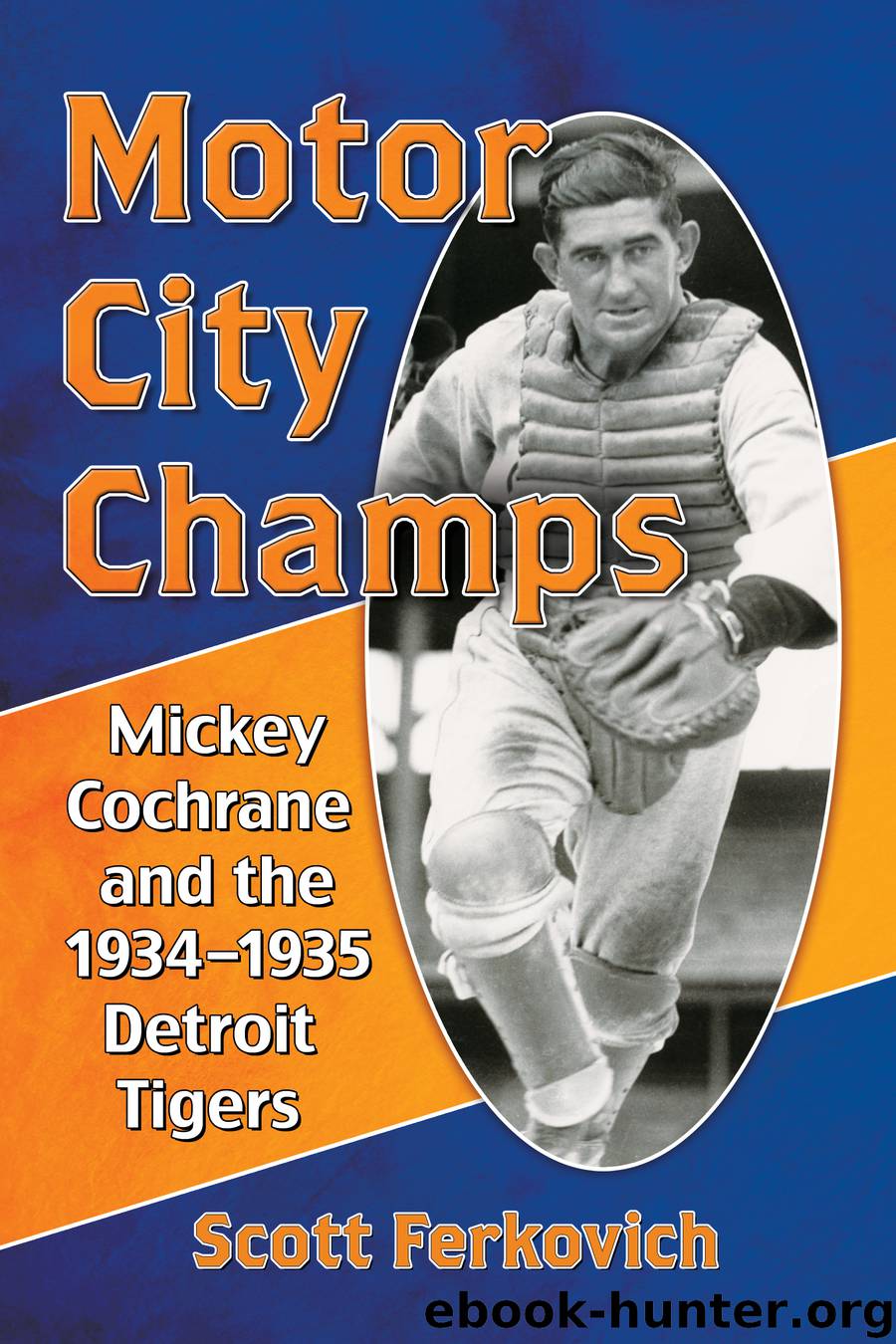Motor City Champs by Scott Ferkovich

Author:Scott Ferkovich
Language: eng
Format: epub
Publisher: McFarland & Company, Inc.
Published: 2018-01-10T16:00:00+00:00
The Tigers’ long, long, grinding baseball season, which had begun in Lakeland back in February, came down to a World Series Game Seven at Navin Field on October 9, 1934. Cochrane, despite his aches and pains, decided he was well enough to play. But who would his starting pitcher be? Having used Rowe the previous day, and with Bridges coming off a complete game in Game Five, the most logical choices were Crowder or Auker. In somewhat of a surprise, Cochrane again passed on Crowder’s experience and handed the ball to Auker, the right-hander who had pitched effectively in the Game Four victory.
The 24-year-old Kansas farm boy had one of the more unusual deliveries in the major leagues, a slinging, sidearm motion that was born out of necessity rather than any desire to be different. In his first football game for Kansas Agricultural and Mechanical College (the forerunner to today’s Kansas State University), Auker separated his shoulder, making it impossible for him to throw overhand. He was forced to completely alter his mechanics and throwing motion, even in football, where he played quarterback.
As a semipro pitcher in Manhattan, Kansas, Auker once squared off against the Kansas City Monarchs and the great Satchel Paige, who had ridden into town with a 33-game winning streak in tow. The only tally Auker surrendered in the 2–1 victory was a home run by catcher T. J. Young. Once out of college, Auker was scouted by the great Bronco Nagurski, who apparently thought a side-arming quarterback could make it in the National Football League. The Chicago Bears offered Auker $6,000, but he chose baseball instead, signing with the Tigers for $450.
Bob Coleman, his manager at Class B Decatur, recommended that Auker go from a side-arming delivery to a completely underhanded one. He fashioned his windup after that of Carl Mays, who won over 200 games in the big leagues with a delivery that went so low his knuckles almost scraped the dirt. Auker caught a lot of ridicule about his unorthodox style, but it produced results: He won 16 games with Beaumont in 1933 and three more with the Tigers after being called up in August. Auker always believed that were it not for his gridiron injury, he never would have reached the major leagues.
With Dizzy Dean gunning for his second Series win, the Tigers had their work cut out for them. It soon became apparent that it was not Auker’s day. He retired Durocher on a fly ball to lead off the third, but after a double, a single, a stolen base, a walk, and another double, he looked up to see Cochrane plodding out to the hill to give him the heave-ho. In an act of desperation, the manager called for Rowe, bruises and all. Schoolboy faced three batters, surrendered a single and a double, and could not be blamed for vowing never again to shake hands with a comedian.
Before the nightmare inning was over, Chief Hogsett and Tommy Bridges were also thrown into the fire.
Download
This site does not store any files on its server. We only index and link to content provided by other sites. Please contact the content providers to delete copyright contents if any and email us, we'll remove relevant links or contents immediately.
The Ultimate Backcountry Survival Manual by Aram Von Benedikt; Editors of Outdoor Life;(2978)
Never by Ken Follett(2919)
Liar's Poker by Michael Lewis(2823)
Machine Learning at Scale with H2O by Gregory Keys | David Whiting(2326)
Will by Will Smith(2077)
The Partner by John Grisham(1989)
Taste by Kris Bryant(1618)
Friends, Lovers, and the Big Terrible Thing by Matthew Perry(1351)
A Short History of War by Jeremy Black(1310)
The Arm by Jeff Passan(1308)
The Dodgers by Schiavone Michael;(1304)
HBR's 10 Must Reads 2022 by Harvard Business Review(1262)
Can't Hurt Me: Master Your Mind and Defy the Odds - Clean Edition by David Goggins(1245)
515945210 by Unknown(1220)
The Yogi Book by Yogi Berra(1205)
1942266391 (N) by Monte Francis(1179)
Road Games by Road Games(1134)
Moneyball by Michael Lewis(1105)
This Family Does It by Kevin Sellers(1084)
